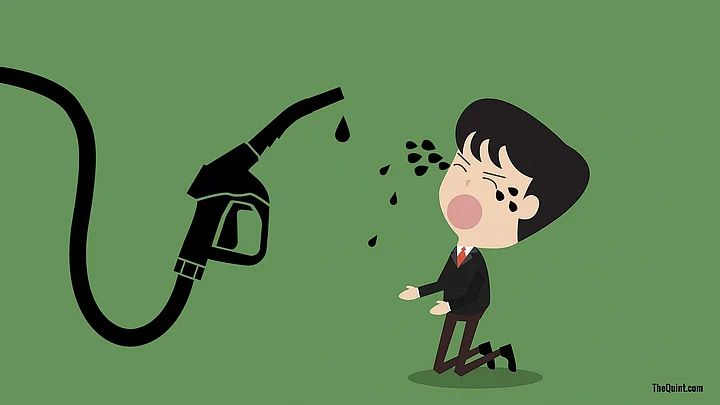Petrol prices crossed Rs 100 per litre in Mumbai on 1 June 2021. The prices of petrol and diesel have been hiked at least 20 times since elections to 4 states and 1 union territory concluded on 29 April.
On 9 June, the petrol price in Delhi stood at Rs 95.56 per litre, and in Mumbai at Rs 101.76. The price of diesel in the national capital is Rs 86.47 per litre, and in Mumbai it’s Rs 93.85 per litre.
The hikes have resulted in fresh record highs across the country, pinching the common man’s purse at a time when we are facing the economic fallout of the pandemic and subsequent lockdowns.
Around 1 crore jobs have been lost, and 97 percent of the population has gotten poorer as compared to 2020, as per CMIE data. High fuel prices can impact inflation in the coming months.
What Explains Recent Price Hike?
The recent increases have been on account of the rise in global crude oil prices by 6 percent in the last one month. Brent crude is trading above USD 70 a barrel on growing optimism that fuel demand will grow in the next quarter.
Petrol prices have been by 35 percent in Delhi since March 2020. Taxes which include excise duties of the central government and value added tax of the state government, now account for 58 percent of the retail selling price in Delhi.
This is more than double the rate (28 percent) on ‘sin’ items such as tobacco, cigarette, and paan masala, and luxury items under the GST regime. Petrol and diesel are out of the GST ambit as of now.
Price Build-Up of Petrol in Delhi
Modi Govt’s Efforts to Shore-Up Revenue
The Narendra Modi government has continued with its policy of using low crude oil prices to shore-up government revenue in its second term, without passing on the full benefits to end-consumers to fund infrastructure and social welfare projects.
Excise duty was raised by Rs 13 and Rs 16 per litre on petrol and diesel between March 2020 and May 2020, taking advantage of international crude oil prices falling to a two-decade low amidst the COVID-19 pandemic.
Since Modi took oath in May 2014, the price charged to dealers by oil companies has declined by 24 percent, due to softening of crude prices internationally from USD 100+ levels to USD 70/bbl levels currently.
However, prices at the pump have increased by 32 percent, since excise duty has almost tripled and VAT has almost doubled.
Movement in Main Components in Delhi Since May 2014 (% Terms)
Movement in Main Components in Delhi Since May 2014 (Absolute Terms Per Litre)
Accounting for Inflation
A status quo, leaving both excise duty and VAT unchanged, would have resulted in petrol prices of Rs 62 per litre today (-35 percent vis-a-vis today).
Even if we apply a normal inflation rate to excise and VAT of 6 percent, the petrol price today should not be higher than May 2014 levels.
A cut in excise duty was expected before the state elections, but the severity of the second wave of COVID-19 ruled it out.
The government’s finances have been hit by the pandemic. India’s GDP contracted by 7.3 percent in the financial year (FY) 20-21. While the economy was recovering from the first wave, as shown by the GDP growth of 1.6 percent last quarter, the second wave struck brutally, claiming many more lives and livelihoods.
Even before the pandemic hit, the Indian economy was experiencing a slowdown, with GDP growth of 4.18 percent in FY 19-20. Aggregate tax collections declined by 4 percent in FY 19-20 and 14 percent in FY 20-21.
Tax & Excise Collections
Govt Walking Tightrope of Fiscal Deficit
The excise duty on fuels have become very important during this time increasing by 4 percent and 26 percent respectively. Excise duty on fuels, as percentage of tax collections, has improved from 12 percent in FY 18-19 to 20 percent in FY 20-21.
The COVID-19 second wave has prompted many agencies to lower their GDP forecasts from 11 percent for FY 21-22 to 9 percent levels. While the economic impact is expected to be lower than experienced in the first wave, government revenue collections could face pressure.
The government is walking a tightrope with a fiscal deficit projected at 6.8 percent, and has very little margin of error on the revenue front. Any major deviation could pose a threat of a ratings downgrade.
My calculations show that a reduction of Rs 5 per litre in petrol / diesel prices could give a boost of Rs 62,500 crore to the economy — and much more — through the multiplier effect.
However, since the government didn’t pass on the benefits to consumers during a low crude oil price scenario, it is difficult to expect any respite now when prices are rising and the government has very little fiscal room.
(The author is an independent political commentator and can be reached at @politicalbaaba. This is an opinion piece. The views expressed above are the author’s own. The Quint neither endorses nor is responsible for them.)
